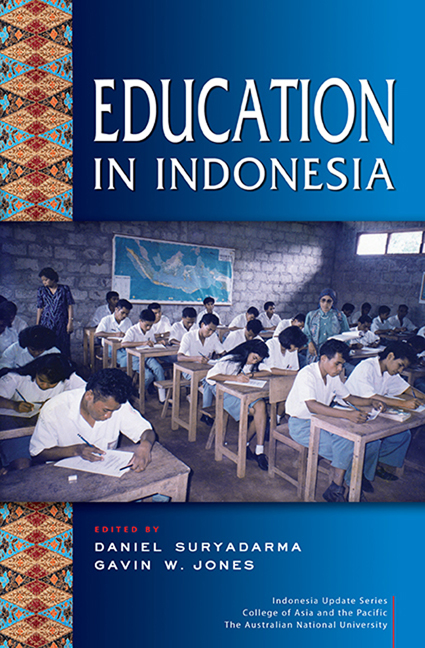Book contents
- Frontmatter
- Contents
- Tables
- Figures
- Contributors
- Acknowledgments
- Glossary
- 1 Meeting the Education Challenge
- 2 Trends in Education in Indonesia
- 3 Teacher Training, School Norms and Teacher Effectiveness in Indonesia
- 4 Integrating Islamic Schools into the Indonesian National Education System: A Case of Architecture over Implementation?
- 5 Early Childhood Education and Development Services in Indonesia
- 6 Where Did All the Money Go? Financing Basic Education in Indonesia
- 7 An Assessment of Policies to Improve Teacher Quality and Reduce Teacher Absenteeism
- 8 Indonesian Universities: Rapid Growth, Major Challenges
- 9 Beating the Odds: Locally Relevant Alternatives to World-class Universities
- 10 Financing Higher Education: The Viability of a Commercial Student Loan Scheme in Indonesia
- 11 The Transformation and Internationalization of Higher Education: The Malaysian Experience
- 12 Role of the Education and Training Sector in Addressing Skill Mismatch in Indonesia
- Index
- Indonesia Update Series
1 - Meeting the Education Challenge
Published online by Cambridge University Press: 21 October 2015
- Frontmatter
- Contents
- Tables
- Figures
- Contributors
- Acknowledgments
- Glossary
- 1 Meeting the Education Challenge
- 2 Trends in Education in Indonesia
- 3 Teacher Training, School Norms and Teacher Effectiveness in Indonesia
- 4 Integrating Islamic Schools into the Indonesian National Education System: A Case of Architecture over Implementation?
- 5 Early Childhood Education and Development Services in Indonesia
- 6 Where Did All the Money Go? Financing Basic Education in Indonesia
- 7 An Assessment of Policies to Improve Teacher Quality and Reduce Teacher Absenteeism
- 8 Indonesian Universities: Rapid Growth, Major Challenges
- 9 Beating the Odds: Locally Relevant Alternatives to World-class Universities
- 10 Financing Higher Education: The Viability of a Commercial Student Loan Scheme in Indonesia
- 11 The Transformation and Internationalization of Higher Education: The Malaysian Experience
- 12 Role of the Education and Training Sector in Addressing Skill Mismatch in Indonesia
- Index
- Indonesia Update Series
Summary
INTRODUCTION
If well-informed persons anywhere in the world were asked about what they knew about education in various countries, they would be likely to have something to say about countries such as India or South Korea. On India, they would be likely to mention the striking contrast between the production of top-flight statisticians and IT professionals on the one hand, and the failure, on the other hand, of millions of Indian children, especially girls, to complete primary school. On South Korea, they would be likely to mention the brilliant performance of Korean students in objective tests, but also that this is achieved at considerable cost, represented by the prevalence of cram schools and the unrelenting pressure on children to succeed.
The same informed persons would be unlikely to have ready answers if asked about education in Indonesia, however. There appear to be few distinctive images of Indonesian education that are widely known internationally. Yet in Indonesia, as elsewhere in Asia, education will inevitably play a key role in the trajectory of national development as the twenty-first century unfolds. Indonesian education may lack a clear image – benign or otherwise – in the international community, but that is not because nothing is happening. The past decade has seen major changes in the structure of the education system and in the schooling trajectories of Indonesian children and adolescents. It has also seen major policy discussions and initiatives. The purpose of this book is not to build an image, but to explore the reality of the current state of education in Indonesia.
Before addressing Indonesian education specifically, we should set the scene by emphasizing just why attention to educational trends and issues should be a key concern for any country pursuing a development agenda. What is the role of education in development?
The literature on this topic is vast and covers a wide range of aspects, including the connections between education and overall economic development, health, fertility, sustainable population growth, workforce productivity and the development of democratic systems of governance. 1 The general import of this literature is that education is of crucial importance, almost across the board, in advancing both workforce and non-workforce-related aspects of development. Equally important is the timing of investments in education; earlier is better, because of the long lead times in translating increased levels of schooling into a more productive workforce.
- Type
- Chapter
- Information
- Education in Indonesia , pp. 1 - 14Publisher: ISEAS–Yusof Ishak InstitutePrint publication year: 2013

